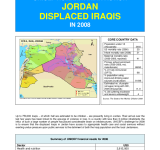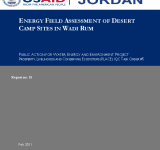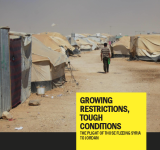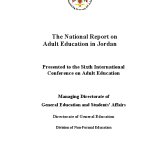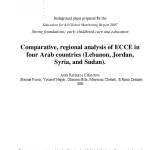والحكومة
The report is based on a field assessment of 16 desert campsites in the city of Aqaba – Wadi Rum and Dieseh districts to evaluate these camps’ energy needs and their current energy situation. As part of the Public Action for Water;; Energy and Environment Project (PAP);; a public education and behavior change communication program developed to support USAID’s technical and policy investments in the Jordanian water and energy sectors;; the report assesses the current government policies and behaviors related to the issues of water;; solid waste and energy at campsites in Wadi Rum and Dieseh. The fieldwork of the report was designed to assess current campsites’ situation and energy profile;; evaluate how to reduce their energy needs;; and assess the possibility of installing renewable energy for electricity. The report concludes with several recommendations such as the enhancement of energy efficiency;; re-design of the electrical lighting systems;; re-wire of the electrical circuits;; and enforcement of laws and regulations.
This report addressed CEDAW Committee by providing a solid and up-to-date information set and analysis of positive policies and legislation taken for women’s advancement and weaknesses that are delaying progress and sustaining disparities. The report covers six components: 1. Jordan’s reservations on CEDAW;; 2. Harmonization of CEDAW into legislation;; 3. Political representation;; 4. Violent against women;; 5. Equal rights in the family;; 6. Conditions of vulnerable and marginalized women. It also provides an overall assessment of the six components covering 3 areas: assessment of the official efforts towards the implementation of CEDAW;; also;; assessment of the civil society efforts and strategies towards monitoring Jordan’s commitment to obligations;; and suggested recommendations for the new concluding observations.
يستند مضمون هذا التقرير المتعلق بالأردن إلى حد كبير إلى زيارة بحثية قامت بها منظمة العفو الدولية إلى البلاد في يونيو/حزيران 2013. وقد التقى وفد المنظمة بممثلي السلطات الأردنية ووكالات الأمم المتحدة والوكالات الإنسانية الدولية والمنظمات غير الحكومية والجمعيات الخيرية;; فضلاً عن أكثر من 150 لاجئاً من سوريا في مجتمعات اللجوء والمجتمعات المضيفة. ونشرت منظمة العفو الدولية هذا التقرير بهدف لفت الانتباه إلى الصعوبات التي يواجهها الفارون من سوريا طلباً للسلامة. وفي الوقت الذي يركز فيه التقرير بشكل رئييس على الأوضاع في الأردن;; فإنه يتضمن تحديثا للمعلومات التي كانت المنظمة قد نشرتها في السابق بشأن التحديات التي يواجهها اللالجئون من سوريا في البلدان المجاورة. وقد أمعنت منظمة العفو الدولية النظر في التحديات التي يواجهها اللاجئون في الأردن;; ولا سيما أولئك الذين يقطنون في مخيم الزعتري;; وهو أضخم مخيمات اللاجئين من سوريا في الأردن. وأجرت المنظمة تحقيقاً حول معاناة اللاجئين;; ليس من ظروف المعيشة القاسية في الصحراء فحسب;; وإنما أيضاً من ارتفاع معدلات الجريمة وغيرها من المخاوف الأمنية.
This national report on Adult Education in Jordan;; is a report presented to the Sixth International Conference on Adult Education. It presents Jordanian educational legislation;; strategies;; policies and laws as well as educational projects and programs. The main theme of this report is the right of education.
This report provides an overview of the status of early childhood care and education (ECCE) in Jordan;; Lebanon;; Sudan;; and Syria. It examines the contextual factors influencing ECCE;; highlighting current policies;; challenges;; and strategies for improvement and expansion. The report underscores the paucity and limitations of available data. Findings show that ECCE services have improved but regional disparity and dominance of the private sector prevail. None of the four countries but Jordan has a full-fledged national strategy and policy on ECCE. Challenges identified include lack of qualified teachers;; societal misconceptions about the unique features of early childhood;; and lack of research-based studies. Innovative projects show that NGOs have been instrumental in addressing the needs of marginalized children.
